人教版(2019) 选择性必修第一册 Unit 4 Body Language 复习课课件(14张PPT)
文档属性
| 名称 | 人教版(2019) 选择性必修第一册 Unit 4 Body Language 复习课课件(14张PPT) |  | |
| 格式 | pptx | ||
| 文件大小 | 1.1MB | ||
| 资源类型 | 教案 | ||
| 版本资源 | 人教版(2019) | ||
| 科目 | 英语 | ||
| 更新时间 | 2022-10-27 10:37:57 | ||
图片预览

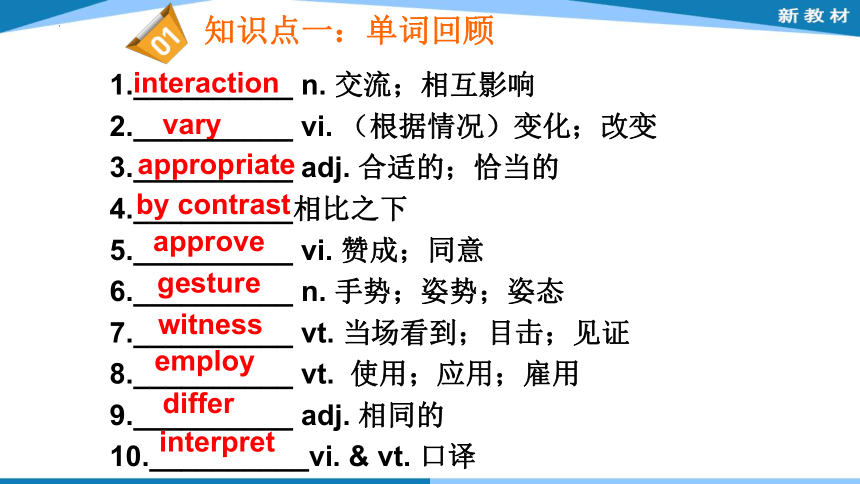
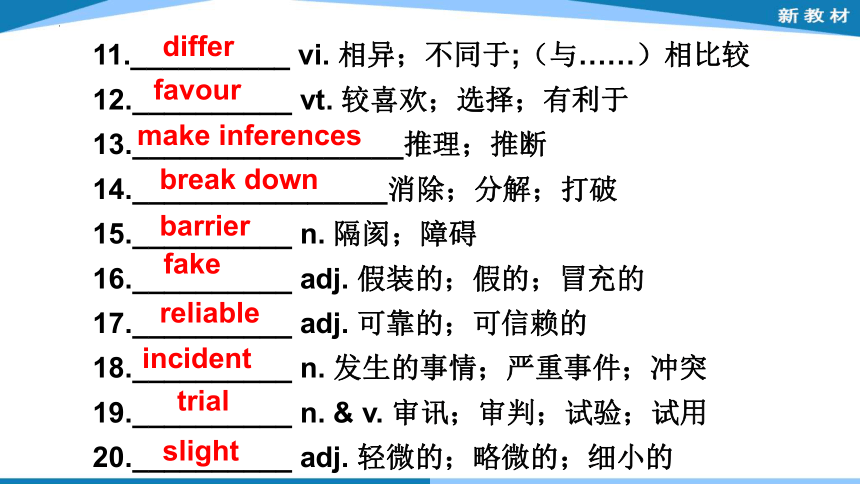
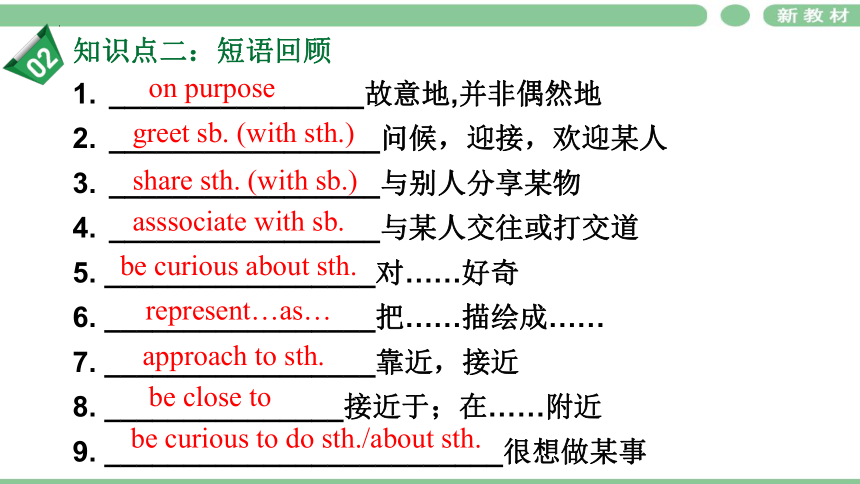
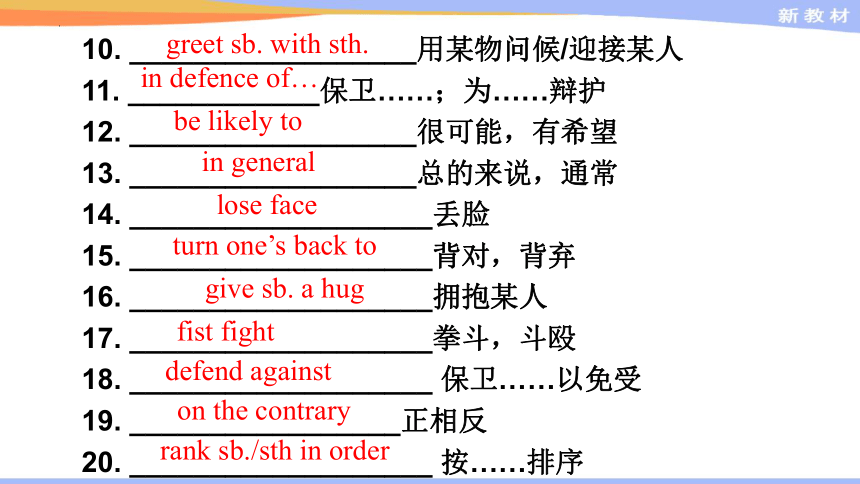
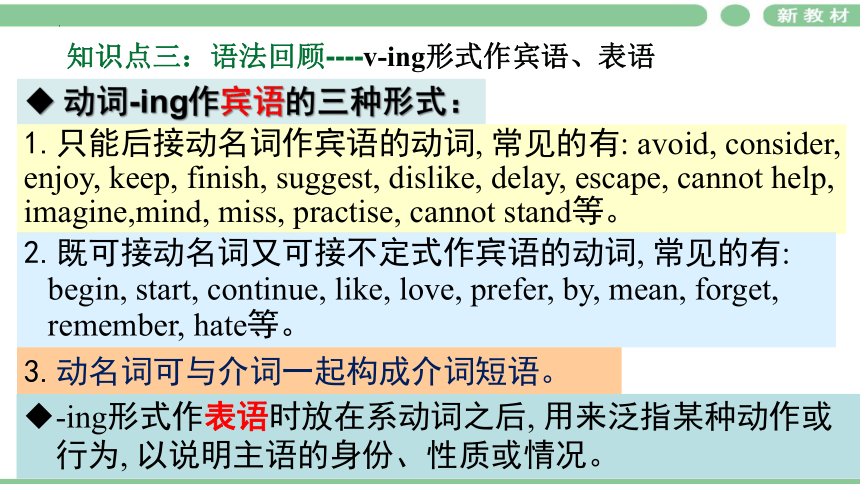
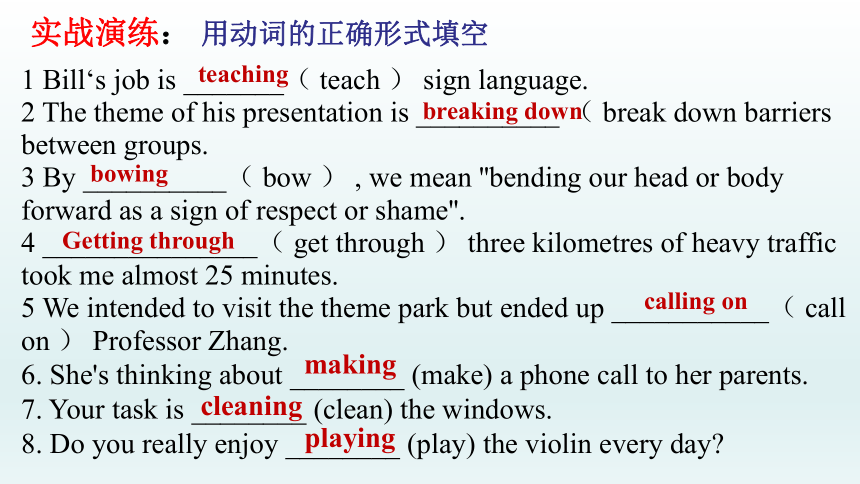
文档简介
(共14张PPT)
Book4--Unit 4
复习课
学习目标
1.掌握单词、词组及其变形和用法
2.语法:v-ing形式作宾语、表语
3.写作:描写肢体语言
知识点一:单词回顾
interaction
vary
appropriate
by contrast
differ
1.__________ n. 交流;相互影响
2.__________ vi. (根据情况)变化;改变
3.__________ adj. 合适的;恰当的
4.__________相比之下
5.__________ vi. 赞成;同意
6.__________ n. 手势;姿势;姿态
7.__________ vt. 当场看到;目击;见证
8.__________ vt. 使用;应用;雇用
9.__________ adj. 相同的
10.__________vi. & vt. 口译
approve
interpret
gesture
employ
witness
fake
reliable
differ
favour
make inferences
incident
break down
slight
barrier
11.__________ vi. 相异;不同于;(与……)相比较
12.__________ vt. 较喜欢;选择;有利于
13._________________推理;推断
14.________________消除;分解;打破
15.__________ n. 隔阂;障碍
16.__________ adj. 假装的;假的;冒充的
17.__________ adj. 可靠的;可信赖的
18.__________ n. 发生的事情;严重事件;冲突
19.__________ n. & v. 审讯;审判;试验;试用
20.__________ adj. 轻微的;略微的;细小的
trial
知识点二:短语回顾
________________故意地,并非偶然地
_________________问候,迎接,欢迎某人
_________________与别人分享某物
_________________与某人交往或打交道
5. _________________对……好奇
6. _________________把……描绘成……
7. _________________靠近,接近
8. _______________接近于;在……附近
9. _________________________很想做某事
on purpose
greet sb. (with sth.)
share sth. (with sb.)
asssociate with sb.
be curious about sth.
represent…as…
approach to sth.
be close to
be curious to do sth./about sth.
10. __________________用某物问候/迎接某人
11. ____________保卫……;为……辩护
12. __________________很可能,有希望
13. __________________总的来说,通常
14. ___________________丢脸
15. ___________________背对,背弃
16. ___________________拥抱某人
17. ___________________拳斗,斗殴
18. ___________________ 保卫……以免受
19. _________________正相反
20. ___________________ 按……排序
in defence of…
on the contrary
defend against
fist fight
give sb. a hug
turn one’s back to
lose face
in general
be likely to
greet sb. with sth.
rank sb./sth in order
知识点三:语法回顾----v-ing形式作宾语、表语
动词-ing作宾语的三种形式:
1.只能后接动名词作宾语的动词, 常见的有: avoid, consider, enjoy, keep, finish, suggest, dislike, delay, escape, cannot help, imagine,mind, miss, practise, cannot stand等。
2.既可接动名词又可接不定式作宾语的动词, 常见的有: begin, start, continue, like, love, prefer, by, mean, forget, remember, hate等。
3.动名词可与介词一起构成介词短语。
-ing形式作表语时放在系动词之后, 用来泛指某种动作或行为, 以说明主语的身份、性质或情况。
实战演练: 用动词的正确形式填空
1 Bill‘s job is _______( teach ) sign language.
2 The theme of his presentation is __________ ( break down barriers between groups.
3 By __________( bow ) , we mean ''bending our head or body forward as a sign of respect or shame''.
4 _______________( get through ) three kilometres of heavy traffic took me almost 25 minutes.
5 We intended to visit the theme park but ended up ___________( call on ) Professor Zhang.
6. She's thinking about ________ (make) a phone call to her parents.
7. Your task is ________ (clean) the windows.
8. Do you really enjoy ________ (play) the violin every day
teaching
breaking down
bowing
Getting through
calling on
making
cleaning
playing
They________(differ) with each other on education matters in the past.
I ____________ (approve) of their decision, but I said nothing against it.
The sword hardly bas goid ________ (vary) in form from the 12th to the 15th century.
Teachers have a limited amount of time______(interact) with each child.
By___________ (compare), expenditure on education increased last year.
6. Police have asked__________ (witness) of the accident to come forward.
7. Let me demonstrate ________ you how it works.
8. They're one of the largest____________ (employ) in the area.
9.The editor________ (bow) to pressure from his staff, and the article was suppressed.
10. I can't figure________the solution to this puzzle.
【巩固训练】一:单句语法填空
differed
disapproved
varied
comparison
to
out
to interact
witnesses
employers
bowed
1.I gave you a map ________ you wouldn’t get lost!
2.I,rather than you,________________ (负责任)the car accident.
3.He ___________ (stay) up late,but now he ________________(go) to bed early.(use)
5.Whoever wants to go there must ______________ (签名)here.
6. It is good to _______________ 对……感到好奇的) the world around you.
7. She is _______________ (最有可能…的女孩)to win the prize.
8. He _____________________(自称是) an expert in English.
am responsible for
be curious about
used to stay
so that
【巩固训练】二:完成句子
the most likely girl
is used to going
sign up
represented himself as
When we think about nonverbal behaviour, or body language, we think about communication. When we think about communication, we think about ___________(interact). So what is our body language ______________ (demonstrate)to others Social scientists have spent a lot of time looking at the effects of our body language. We make assessments and inferences from body language. And according to those judgements we approve ____one person and dislike another. So body language provides external ______ (clue)that are influenced by internal thoughts and feelings.
Scientists have found ______ when we feel proud and powerful, we usually straighten up to make ourselves bigger. _____ contrast, when we feel powerless, we tend to slump, making ourselves smaller. It is obvious that our minds can __________ (influent) our bodies. But is it also true that our bodies can affect our minds Scientific experiments show that if we make powerful __________ (gesture) long enough, we may actually feel more powerful. People who remember to use positive body language are more likely to feel positive by _____________ (compare) , so some scientists suggest that we use our bodies to try power posing to help break________ our feelings of shyness and powerlessness.
【巩固训练】三:语法填空
interaction
demonstrating
of
clues
By
gestures
comparison
down
that
influence
【巩固训练】四:写作训练
加入你是李华,你校校报的英文版就“肢体语言的差异”征稿,请你根据以下表格内容提示写一篇文章,给校报投稿,词数100左右
【possible answer:】
As we have more communication with foreigners, we should pay more attention to the differences in the body language. As we see from the table, many differences exist between Chinese and American body language. It has been found that there are more physical touches between people in China than in America. Women in China often walk hand in hand, which is not so common in America. In America, people usually keep a distance between them and they seldom touch each other, especially for people of the same sex. Also Americans think it rude to put out one’s tongue, while the Chinese often use this gesture when they are embarrassed. Furthermore, Chinese people will pat children on the head if they like them, while Americans do so when they want to express encouragement or comfort. In a word, differences do exist; only by fully understanding all the differences in body language can we expect to communicate properly.
Book4--Unit 4
复习课
学习目标
1.掌握单词、词组及其变形和用法
2.语法:v-ing形式作宾语、表语
3.写作:描写肢体语言
知识点一:单词回顾
interaction
vary
appropriate
by contrast
differ
1.__________ n. 交流;相互影响
2.__________ vi. (根据情况)变化;改变
3.__________ adj. 合适的;恰当的
4.__________相比之下
5.__________ vi. 赞成;同意
6.__________ n. 手势;姿势;姿态
7.__________ vt. 当场看到;目击;见证
8.__________ vt. 使用;应用;雇用
9.__________ adj. 相同的
10.__________vi. & vt. 口译
approve
interpret
gesture
employ
witness
fake
reliable
differ
favour
make inferences
incident
break down
slight
barrier
11.__________ vi. 相异;不同于;(与……)相比较
12.__________ vt. 较喜欢;选择;有利于
13._________________推理;推断
14.________________消除;分解;打破
15.__________ n. 隔阂;障碍
16.__________ adj. 假装的;假的;冒充的
17.__________ adj. 可靠的;可信赖的
18.__________ n. 发生的事情;严重事件;冲突
19.__________ n. & v. 审讯;审判;试验;试用
20.__________ adj. 轻微的;略微的;细小的
trial
知识点二:短语回顾
________________故意地,并非偶然地
_________________问候,迎接,欢迎某人
_________________与别人分享某物
_________________与某人交往或打交道
5. _________________对……好奇
6. _________________把……描绘成……
7. _________________靠近,接近
8. _______________接近于;在……附近
9. _________________________很想做某事
on purpose
greet sb. (with sth.)
share sth. (with sb.)
asssociate with sb.
be curious about sth.
represent…as…
approach to sth.
be close to
be curious to do sth./about sth.
10. __________________用某物问候/迎接某人
11. ____________保卫……;为……辩护
12. __________________很可能,有希望
13. __________________总的来说,通常
14. ___________________丢脸
15. ___________________背对,背弃
16. ___________________拥抱某人
17. ___________________拳斗,斗殴
18. ___________________ 保卫……以免受
19. _________________正相反
20. ___________________ 按……排序
in defence of…
on the contrary
defend against
fist fight
give sb. a hug
turn one’s back to
lose face
in general
be likely to
greet sb. with sth.
rank sb./sth in order
知识点三:语法回顾----v-ing形式作宾语、表语
动词-ing作宾语的三种形式:
1.只能后接动名词作宾语的动词, 常见的有: avoid, consider, enjoy, keep, finish, suggest, dislike, delay, escape, cannot help, imagine,mind, miss, practise, cannot stand等。
2.既可接动名词又可接不定式作宾语的动词, 常见的有: begin, start, continue, like, love, prefer, by, mean, forget, remember, hate等。
3.动名词可与介词一起构成介词短语。
-ing形式作表语时放在系动词之后, 用来泛指某种动作或行为, 以说明主语的身份、性质或情况。
实战演练: 用动词的正确形式填空
1 Bill‘s job is _______( teach ) sign language.
2 The theme of his presentation is __________ ( break down barriers between groups.
3 By __________( bow ) , we mean ''bending our head or body forward as a sign of respect or shame''.
4 _______________( get through ) three kilometres of heavy traffic took me almost 25 minutes.
5 We intended to visit the theme park but ended up ___________( call on ) Professor Zhang.
6. She's thinking about ________ (make) a phone call to her parents.
7. Your task is ________ (clean) the windows.
8. Do you really enjoy ________ (play) the violin every day
teaching
breaking down
bowing
Getting through
calling on
making
cleaning
playing
They________(differ) with each other on education matters in the past.
I ____________ (approve) of their decision, but I said nothing against it.
The sword hardly bas goid ________ (vary) in form from the 12th to the 15th century.
Teachers have a limited amount of time______(interact) with each child.
By___________ (compare), expenditure on education increased last year.
6. Police have asked__________ (witness) of the accident to come forward.
7. Let me demonstrate ________ you how it works.
8. They're one of the largest____________ (employ) in the area.
9.The editor________ (bow) to pressure from his staff, and the article was suppressed.
10. I can't figure________the solution to this puzzle.
【巩固训练】一:单句语法填空
differed
disapproved
varied
comparison
to
out
to interact
witnesses
employers
bowed
1.I gave you a map ________ you wouldn’t get lost!
2.I,rather than you,________________ (负责任)the car accident.
3.He ___________ (stay) up late,but now he ________________(go) to bed early.(use)
5.Whoever wants to go there must ______________ (签名)here.
6. It is good to _______________ 对……感到好奇的) the world around you.
7. She is _______________ (最有可能…的女孩)to win the prize.
8. He _____________________(自称是) an expert in English.
am responsible for
be curious about
used to stay
so that
【巩固训练】二:完成句子
the most likely girl
is used to going
sign up
represented himself as
When we think about nonverbal behaviour, or body language, we think about communication. When we think about communication, we think about ___________(interact). So what is our body language ______________ (demonstrate)to others Social scientists have spent a lot of time looking at the effects of our body language. We make assessments and inferences from body language. And according to those judgements we approve ____one person and dislike another. So body language provides external ______ (clue)that are influenced by internal thoughts and feelings.
Scientists have found ______ when we feel proud and powerful, we usually straighten up to make ourselves bigger. _____ contrast, when we feel powerless, we tend to slump, making ourselves smaller. It is obvious that our minds can __________ (influent) our bodies. But is it also true that our bodies can affect our minds Scientific experiments show that if we make powerful __________ (gesture) long enough, we may actually feel more powerful. People who remember to use positive body language are more likely to feel positive by _____________ (compare) , so some scientists suggest that we use our bodies to try power posing to help break________ our feelings of shyness and powerlessness.
【巩固训练】三:语法填空
interaction
demonstrating
of
clues
By
gestures
comparison
down
that
influence
【巩固训练】四:写作训练
加入你是李华,你校校报的英文版就“肢体语言的差异”征稿,请你根据以下表格内容提示写一篇文章,给校报投稿,词数100左右
【possible answer:】
As we have more communication with foreigners, we should pay more attention to the differences in the body language. As we see from the table, many differences exist between Chinese and American body language. It has been found that there are more physical touches between people in China than in America. Women in China often walk hand in hand, which is not so common in America. In America, people usually keep a distance between them and they seldom touch each other, especially for people of the same sex. Also Americans think it rude to put out one’s tongue, while the Chinese often use this gesture when they are embarrassed. Furthermore, Chinese people will pat children on the head if they like them, while Americans do so when they want to express encouragement or comfort. In a word, differences do exist; only by fully understanding all the differences in body language can we expect to communicate properly.
